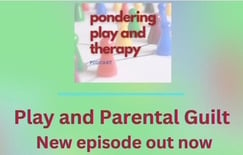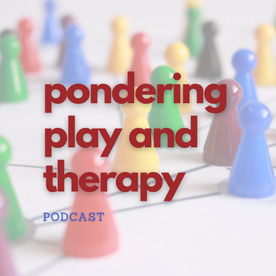
Play and Parental Guilt
For parents, grandparents or a caregiver there can be a subtle but consistent pressure to be "good enough," and this can include playing with our children or engaging with our teenagers. This could be providing the 'amazing' play environment or providing an out of this world craft experience, the idea that parents should be fully invested in play can feel like a chore or burden rather than a pleasure or enjoyment. But what happens when you simply don’t enjoy it? Or when you just feel like you don't have the time for long play sessions? For many parents, the guilt can feel overwhelming. The role of play in a child’s development is important in supporting the child's creativity and social skills to building their cognitive abilities. However, this pressure for parents to be actively playing with their child can lead to feelings of not being good enough for parents who find themselves struggling to enjoy play or to make time for it in their already busy lives.
Philippa
2/26/20254 min read


The Guilt of Not Enjoying Play
It can feel like we should always be playing, entertaining and engaging our children. But for some parents, some of the time, most of the time, it can be not a matter of disinterest but an overwhelming sense of duty and time limitations that prevents them from being the playful parent they imaged they would be. In a world where parental involvement is often seen as the quality parenting, it’s easy to believe that if you’re not playing alongside your child, you’re somehow failing them.
But as Julie and I have discussed on a recent podcast: it’s okay to not always enjoy or even want to play. Every parent has different ways of connecting with their child. Some may bond over reading a book or playing music, others through cooking together, or even by sharing a mime or having a conversation. The idea that play is about getting on the floor, spending hours or having an endless about of toys. As we pondered in our podcast, often facilitating play, noticing our children, providing the space both physically and psychological can be more important and create a deeper more meaningful connection and attachment.
https://www.buzzsprout.com/2422439/episodes/16537854
Children learn from watching their safe adult navigate life, including how to manage busy schedules and make time for their own interests as adults. This helps to model time management and the importance of caring for oneself, which is so important for our mental health and wellbeing Sometimes, that means setting aside time for personal hobbies or just relaxing, which isn’t a failure of parenting, but helps us to refill our emotional resilience so we can provide the parenting we strive to for our children.
Has play changed over the last 30 years?
Julie and I thought about our experiences of play and how we felt we played. It was often outside and largely unsupervised, fueled by imagination and the desire to engage with the world in a physical way. Kids spent hours riding bikes, playing tag, or just hanging around the streets, until it went dark or our parents called us in. The availability of outdoor space and the relative safety of those environments allowed for a more freeform, active kind of play.
But in 2025, there seems to be less outdoor space, there is the rising costs of housing, and a general trend towards more compact living have meant fewer children have access to gardens or parks, particularly in cities areas. While some cities have made efforts to create child-friendly spaces, such as the Olympic Park in Stratford London, and Scotland has enshrined in Law that children must be provided with areas to play. Julie reflected that whilst she lives in a city she rarely hears or sees children out at play.
It seems children and teenagers are often spending more time indoors. On things such as Xbox, Play Stations, social media, or watching YouTube and TikTok, social media. This shift in how children play, combined with the reduced outdoor spaces, means that play isn’t always as physical, creative, or social as it once was.
Social Media and the portrayal of family life
Social media can provide us with a continuous content of "perfect parent" images and this can play a big role in increasing the pressure that parents can feel. The content creators on these platform can appear to be effortlessly juggle working, cooking, cleaning, and spending time creating the perfect playdates. They share pictures of arts and crafts projects, baking sessions, and hours of play with their kids. It can create an impossible standard for others to live up to. Especially if we don't enjoy playing, baking, cleaning or just don't have the time, have pressures from other parts of our lives or never really learnt how to play. This can result in parents feeling guilt or that they are not being a 'good enough' parent.
However, on our parental guilt podcast what we thought about was what really matters as a child, as a parent is connection. That every family is different, and each child’s needs and preferences for play vary. Some children love outdoor games, others are content with screen-based activities or quieter, solo play. It’s not about having the "perfect" playtime, but about the quality of interaction and attention given.
In our humble view it is: Quality Over Quantity
In the face of guilt, shifting societal expectations, it is really important to remember that play and being playful are just one part of parenting. That giving yourself a break from the 'perfect' imagine that you've just seen on Instagram or if like me feeling you weren't measuring up to the other parents in the toddler group and focus on the quality of the time you do spend with your child. A 3-minute connection where you truly engage and possible enjoy is worth far more than hours of forced play. Sometimes we really do have to fake it until we make it and that's ok too.
When pondering play maybe the most important thing about it is it can be done in so many ways. The value of play isn’t really in how many hours you spend playing, but in the connections and nurture, you give to your child, the fun you might have, the moment of joy that can make all the hard stuff a little more manageable.
So be kind to yourself and know we are often doing the best we can.






